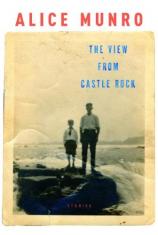The View From Castle Rock: Stories
Review
The View From Castle Rock: Stories
When it comes to writing short stories, Canadian author Alice Munro (RUNAWAY) is one of the best. She has published 11 new collections of short stories, a volume of SELECTED STORIES and a full-length novel. Her stories' timelines and subject matter range from birth to death and hit every thinkable topic in between. She is the master of unmasking feelings through words, and her landscapes are so vividly depicted that one can envision them jumping off the page and into reality.
In this latest collection, Munro turns her attention inward and delves deeper into her own experiences than ever before. These 12 stories --- including the epilogue's sole story entitled "Messenger" --- are slight variations and half-true fabrications of actual events that took place over the last few centuries on one side of her family's history. As she writes in the Foreword, "You could say that such stories pay more attention to the truth of a life than fiction usually does. But not enough to swear on. And the part of this book that might be called family history has expanded into fiction, but always within the outline of a true narrative."
The first half of THE VIEW FROM CASTLE ROCK includes a set of five stories, all loosely based on her family's journey from the Ettrick Valley in Scotland to North America and the beginnings of their lives there. In "No Advantages," she describes her poor, hard-working Scottish ancestors in great detail --- half, what was; and the other half, what might have been. In "The View from Castle Rock," a young boy catches a glimpse of America --- and, in turn, his father's dreams --- while perched atop Castle Rock in Edinburgh. (Years later, the affirmation of his hunch that his father was drunk that day and that "America" was merely Fife makes the rest of the story seem all the sweeter.) Here, and continuing on into "Illinois," "The Wilds of Morris Township" and "Working for a Living," the hardships of daily toil, disease, famine and sacrifice, and the saving graces of religious faith and family loyalty, are felt on every page.
The second half of CASTLE ROCK is more loosely connected and consists of stories written during but not published in her recent short story collections. "They were not memoirs," she writes, "but they were closer to my own life than the other stories I had written, even in the first person…I was doing something closer to what a memoir does --- exploring a life, but not in an austere or rigorously factual way. I put myself in the center and wrote about that self, as searchingly as I could." And, as in the first section, the characters around this "self" take off and create a gloriously imagined life of their own.
What stands out most in these stories (and in most, if not all, of her others) is Munro's uncanny gift for turning a phrase and her ability to capture the essence of a moment within the bookends of a few carefully chosen words. In "Lying Under the Apple Tree" --- one of the best in the collection --- a young girl's first fumblings with lust and a Salvation Army boy of lower class is beautifully portrayed in the pairing of question and observation: "Or does it always seem natural to whisper in the dark? Or when you have gone weak in the legs but aching, determined, in another part of your body." In both "Home" and "What Do You Want to Know For?" --- two equally magnificent and ruminant pieces about the nature of belonging and feeling at home in one's present while yearning to grasp the unattainable past and lay claim to the unforeseeable future --- there are countless instances when the urge to stop and meditate on a paragraph or a sentence should certainly be heeded. These are the passages that encapsulate the marrow of life, and in Munro's capable hands they ring true every time.
Regarding her inspiration for THE VIEW FROM CASTLE ROCK, she writes, "Some of the characters gave themselves to me in their own words, others rose out of their situations. Their words and my words, a curious re-creation of lives, in a given setting that was as truthful as our notion of the past can ever be." It is this natural talent for seamlessly fusing habit with possibility, permanence with intention, and fact with fiction, that makes Munro's stories such a unique pleasure to read.
Reviewed by Alexis Burling on January 24, 2011
The View From Castle Rock: Stories
- Publication Date: November 7, 2006
- Genres: Fiction, Short Stories
- Hardcover: 349 pages
- Publisher: Knopf
- ISBN-10: 1400042828
- ISBN-13: 9781400042821





